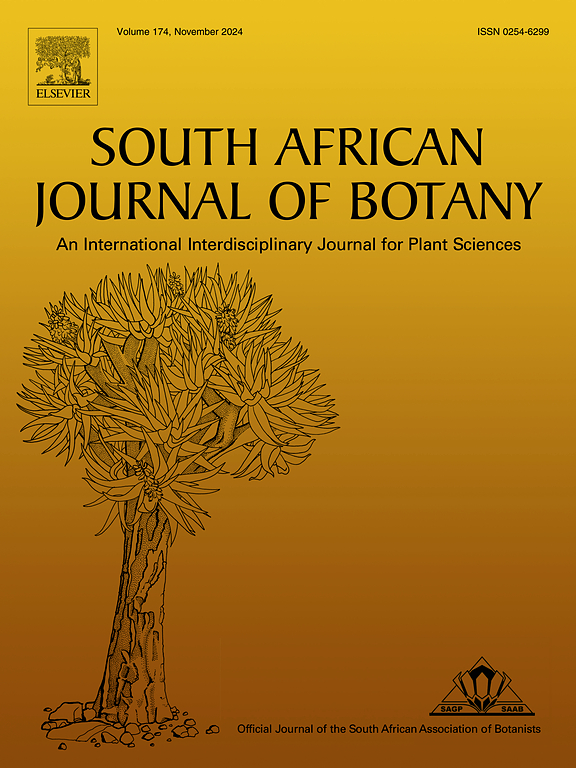“一氧化氮可以增强橄榄树的抗氧化防御能力,抵御意外的温度下降。”
IF 2.7
3区 生物学
Q2 PLANT SCIENCES
引用次数: 0
摘要
一氧化氮(NO)是一种重要的信号分子,具有增强植物反应的重要潜力,特别是在与现代气候变化相关的环境胁迫下。硝普钠(SNP)是一种NO供体,在这方面显示出良好的效果。为了研究NO在提高橄榄树抗冻性中的作用,研究人员对橄榄树进行了不同浓度的SNP处理(0 μM、100 μM和200 μM),然后在-1、-3和-6°C的冷冻温度下进行处理。100 μM SNP浓度的效果最为显著,其效果取决于应激的严重程度。100 μM SNP处理增强了抗氧化酶如CAT、SOD、POX和APX的活性,并显著提高了非酶抗氧化水平,包括总酚、黄酮类、黄酮醇和花青素。这些增强在-1℃时达到48.48%,在-3℃时达到21.8%,在-6℃时达到51.78%,在控制条件下达到42.6%。经snp处理的橄榄植株光合色素和叶绿素前体水平也有所提高,表明NO对光合过程有积极影响。此外,100 μM SNP处理促进了渗透调节,脯氨酸含量增加96.28%,总可溶性糖发生变化。这些适应性反应有助于降低H2O2含量、MDA水平、电解质泄漏和延长叶片寿命,突出了SNP在增强膜稳定性和整体植物活力方面的作用。这些发现强调了NO在调节关键生理和代谢过程中的多方面作用,这些过程支持橄榄树在低温胁迫下的恢复能力。本文章由计算机程序翻译,如有差异,请以英文原文为准。
“Nitric oxide boosts antioxidant defense in olive trees against unexpected temperature drops”
Nitric oxide (NO), a critical signaling molecule, holds significant potential for enhancing plant responses, especially under environmental stresses associated with modern climate changes. Sodium nitroprusside (SNP), an NO donor, has shown promising effects in this regard. To investigate the role of NO in increasing freezing stress tolerance in olive trees, plants were treated with varying concentrations of SNP (0 μM as control, 100 μM, and 200 μM) and then subjected to freezing temperatures of -1, -3, and -6 °C. 100 μM SNP concentration yielded the most notable benefits, with efficacy dependent on stress severity. Treatment with 100 μM SNP enhanced the activity of antioxidant enzymes such as CAT, SOD, POX, and APX and significantly increased non-enzymatic antioxidant levels, including total phenols, flavonoids, flavonols, and anthocyanins. These enhancements reached up to 48.48 % at -1 °C, 21.8 % at -3 °C, 51.78 % at -6 °C, and 42.6 % under control conditions. SNP-treated olive plants also exhibited improved levels of photosynthetic pigments and chlorophyll precursors, indicating a positive influence of NO on photosynthetic processes. Furthermore, 100 μM SNP administration promoted osmotic regulation, evidenced by a 96.28 % increase in proline content and changes in total soluble sugars. These adaptive responses contributed to reduced H2O2 content, MDA levels, electrolyte leakage, and increased leaf longevity, highlighting SNP's role in enhancing membrane stability and overall plant vitality. The findings underscore NO's multifaceted role in modulating key physiological and metabolic processes that support olive tree resilience under low-temperature stress.
求助全文
通过发布文献求助,成功后即可免费获取论文全文。
去求助
来源期刊

South African Journal of Botany
生物-植物科学
CiteScore
5.20
自引率
9.70%
发文量
709
审稿时长
61 days
期刊介绍:
The South African Journal of Botany publishes original papers that deal with the classification, biodiversity, morphology, physiology, molecular biology, ecology, biotechnology, ethnobotany and other botanically related aspects of species that are of importance to southern Africa. Manuscripts dealing with significant new findings on other species of the world and general botanical principles will also be considered and are encouraged.
 求助内容:
求助内容: 应助结果提醒方式:
应助结果提醒方式:


